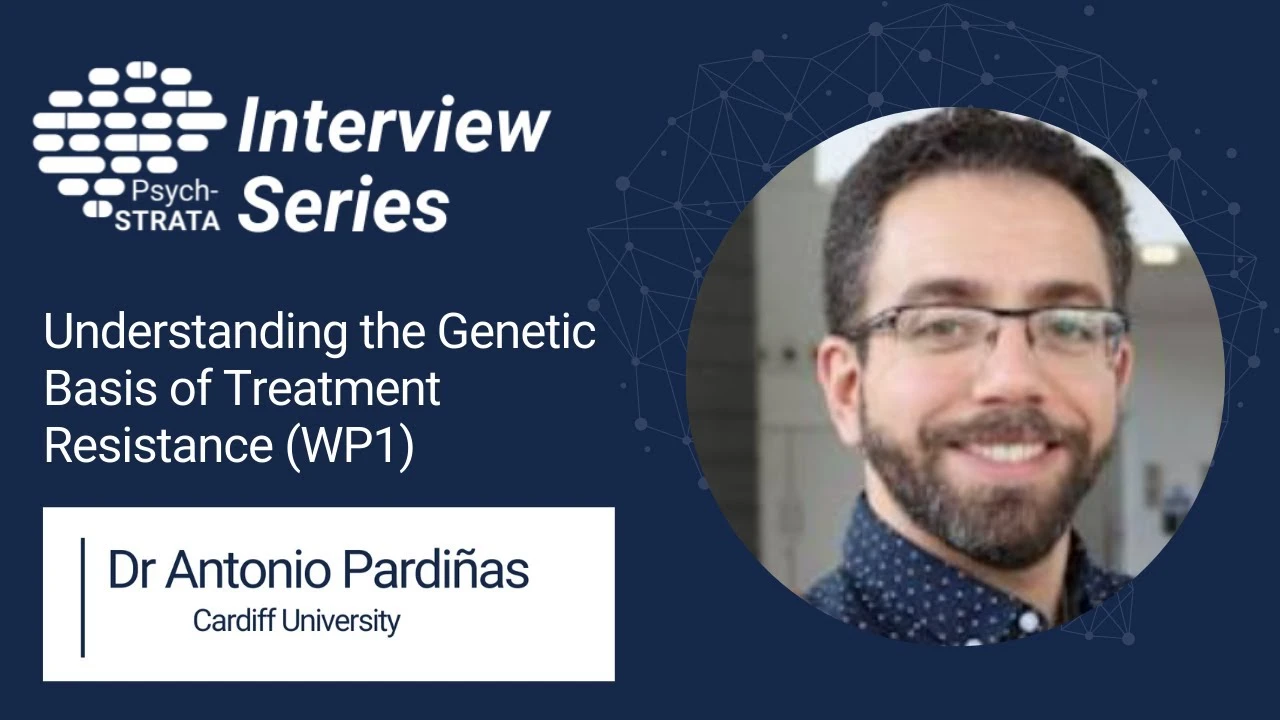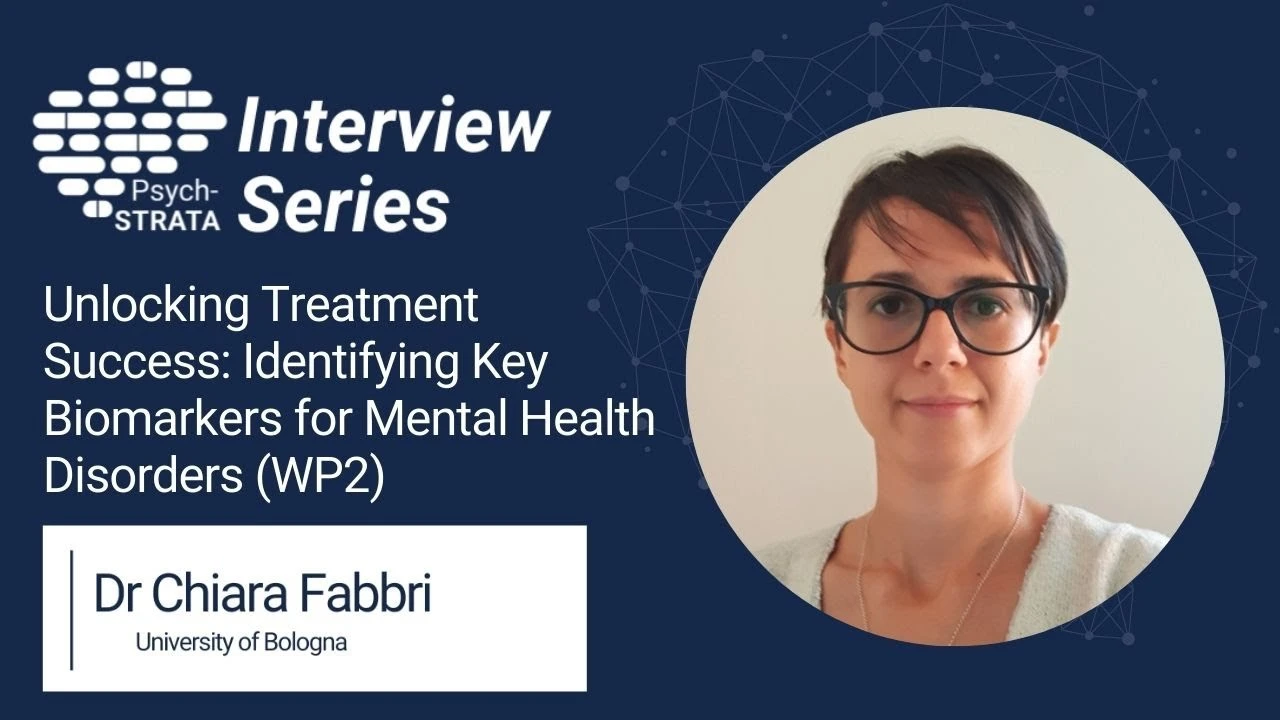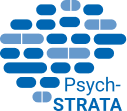The project tackles treatment resistance (TR), a problem affecting a third of patients with major mental disorders who don’t respond to drug therapy. These patients often face a trial-and-error treatment approach, which is inefficient and stressful. It can take long time before the right treatment/drug has been found and be prescribed.
The main aim of the project is to address this by identifying at-risk individuals earlier, developing personalised treatment strategies grounded in the biological basis of TR, and efficiently implementing these insights in clinical practice and treatment guidelines in mental health care.
Psych-STRATA will examine diverse data, including genetic, biological, digital mental health, and clinical information to better understand TR and identify these patients at risk. Using Europe-wide clinical trial information, the project will determine optimal treatment strategies for those at risk of TR.
The research will aid in the creation of new machine-learning models to predict TR risk and treatment response. Finally, the project aims to integrate these findings into clinical practice, assisting clinicians and patients in making informed treatment decisions during the process of ‘shared decision making’.
Das Projekt befasst sich mit der Behandlungsresistenz (TR), einem Problem, das ein Drittel der Patienten mit schweren psychischen Störungen betrifft, die nicht auf eine medikamentöse Behandlung ansprechen. Diese Patienten sind häufig mit einem Versuch-und-Irrtum-Behandlungsansatz konfrontiert, der ineffizient und belastend ist. Es kann lange dauern, bis die richtige Behandlung/das richtige Medikament gefunden ist und verschrieben werden kann.
Das Hauptziel des Projekts besteht darin, dieses Problem zu lösen, indem Risikopersonen früher identifiziert werden, personalisierte Behandlungsstrategien entwickelt werden, die auf den biologischen Grundlagen von TR beruhen, und diese Erkenntnisse effizient in die klinische Praxis und Behandlungsrichtlinien in der psychiatrischen Versorgung umgesetzt werden.
Psych-STRATA wird verschiedene Daten untersuchen, darunter genetische, biologische, digitale psychische Gesundheits- und klinische Informationen, um TR besser zu verstehen und diese Risikopatienten zu identifizieren. Anhand von Informationen aus europaweiten klinischen Studien wird das Projekt optimale Behandlungsstrategien für TR-Risikopatienten ermitteln.
Die Forschungsarbeiten werden zur Entwicklung neuer Modelle des maschinellen Lernens beitragen, mit denen sich das TR-Risiko und das Ansprechen auf die Behandlung vorhersagen lassen. Schließlich zielt das Projekt darauf ab, diese Erkenntnisse in die klinische Praxis zu integrieren, um Kliniker und Patienten dabei zu unterstützen, im Rahmen der gemeinsamen Entscheidungsfindung” fundierte Behandlungsentscheidungen zu treffen.
Het project pakt therapieresistentie (TR) aan, een probleem dat een derde van de patiënten met ernstige psychische aandoeningen treft die niet reageren op een behandeling met medicijnen. Deze patiënten worden vaak geconfronteerd met een aanpak van trial-and-error behandeling, die inefficiënt en stressvol is. Het kan lang duren voordat de juiste behandeling/drug is gevonden en wordt voorgeschreven.
Het belangrijkste doel van het project is om dit aan te pakken door risicopatiënten eerder te identificeren, gepersonaliseerde behandelingsstrategieën te ontwikkelen op basis van de biologische basis van TR en deze inzichten efficiënt te implementeren in de klinische praktijk en behandelingsrichtlijnen in de geestelijke gezondheidszorg.
Psych-STRATA zal verschillende gegevens onderzoeken, waaronder genetische, biologische, digitale en klinische informatie om TR beter te begrijpen en risicopatiënten te identificeren. Met behulp van informatie uit Europese klinische onderzoeken zal het project optimale behandelstrategieën bepalen voor mensen die risico lopen op TR.
Het onderzoek zal helpen bij het creëren van nieuwe machine-learning (met behulp van artificiële intelligentie) modellen om het risico op TR en de respons op de behandeling te voorspellen. Tot slot wil het project deze bevindingen integreren in de klinische praktijk en artsen en patiënten helpen bij het nemen van geïnformeerde beslissingen over behandeling tijdens het proces van ‘gedeelde besluitvorming’.
Il progetto affronta il problema della farmacoresistenza (treatment resistance – TR in inglese), riguardante un terzo dei pazienti con gravi disturbi mentali. Questi pazienti devono spesso affrontare un approccio terapeutico per tentativi ed errori, che risulta essere spesso inefficiente e stressante; inoltre è possibile che passi molto tempo prima che venga individuata e prescritta la terapia più appropriata.
L’obiettivo principale del progetto è quello di risolvere questo problema identificando in modo precoce i soggetti a rischio, sviluppando delle strategie di trattamento personalizzate basate sulle basi biologiche della TR ed implementando queste conoscenze nella pratica clinica e nelle linee guida per il trattamento nell’ambito della salute mentale.
Psych-STRATA prenderà in esame diversi dati; informazioni cliniche, genetiche, biologiche ed inerenti alla salute mentale telematica, per comprendere al meglio la TR ed identificare i pazienti a rischio. Utilizzando le informazioni sugli studi clinici condotti in tutta Europa, il progetto determinerà le strategie di trattamento ottimali per i soggetti a rischio.
La ricerca contribuirà alla creazione di nuovi modelli di apprendimento automatico (machine-learning) al fine di prevedere il rischio di resistenza e risposta al trattamento. Infine, il progetto mira ad integrare questi risultati nella pratica clinica, assistendo medici e pazienti nel prendere decisioni condivise riguardo la terapia da intraprendere (processo di “shared decision making”).
Le projet s’intéresse à la résistance aux traitements (RT), un problème qui touche un tiers des patients atteints de troubles mentaux majeurs qui ne répondent pas à la pharmacothérapie. Ces patients recvoivent différents traitements par essais-erreurs, un parcours souvent inefficace et stressant. Il peut s’écouler beaucoup de temps avant que le bon traitement/médicament soit trouvé et prescrit.
L’objectif principal du projet est de résoudre ce problème en identifiant très tôt les personnes à risque de resistance aux traitements (RT), en développant des stratégies de traitement personnalisé fondées sur la biologie de la RT appliquées à la pratique clinique et en proposant des directives pour préserver la santé mentale.
Psych-STRATA examinera diverses données, notamment des informations génétiques, biologiques, numériques sur la santé mentale et des informations cliniques afin de mieux comprendre la RT et d’identifier les patients à risque. En utilisant les informations des essais cliniques réalisés à l’échelle européenne, le projet déterminera les stratégies de traitement optimal pour les personnes à risque de RT.
La recherche contribuera à l’élaboration de nouveaux modèles d’apprentissage automatique pour prédire le risque de RT et la réponse à différents traitements. Enfin, le projet vise à intégrer ces résultats dans la pratique clinique, en aidant les cliniciens et les patients à prendre les meilleures décisions de traitement au cours d’un processus de “prise de décision partagée”.












A ‘patient advisory board’ can prioritise the patient experience and enable patients to participate in improving quality of care.
Patients’ engagement in the field of (clinical) research is important in order to achieve more ‘patient-focussed’ research supported by input of experts with lived experience representing the ‘patients’ voice’.
Therefore, patient involvement in EU (e.g. Horizon (2020)) Research projects has meanwhile become a condition for EU funding.
Similar to the concept in the health care system, the Board is a representative group of patients (and caregivers) who meet regularly to discuss the contribution of the patient’s perspective in the on-going and future research activities throughout the project. Researchers are, when relevant, invited to present and discuss topics that demand input from the board during these meetings.
Ein “Patientenbeirat” kann die Patientenerfahrungen in den Vordergrund stellen und die Patienten in die Lage versetzen, an der Verbesserung der Qualität der Versorgung mitzuwirken.
Die Einbeziehung der Patienten in die (klinische) Forschung ist wichtig, um eine stärker auf die Patienten ausgerichtete Forschung zu erreichen, die durch den Beitrag von Experten mit Lebenserfahrung unterstützt wird, die die “Stimme der Patienten” vertreten.
Daher ist die Einbeziehung von Patienten in EU-Forschungsprojekte (z. B. Horizon (2020)) inzwischen eine Bedingung für die EU-Finanzierung geworden.
Ähnlich dem Konzept im Gesundheitswesen ist der Beirat eine repräsentative Gruppe von Patienten (und Betreuern), die sich regelmäßig trifft, um den Beitrag der Patientenperspektive zu den laufenden und zukünftigen Forschungsaktivitäten während des Projekts zu diskutieren. Gegebenenfalls werden Forscher eingeladen, bei diesen Treffen Themen vorzustellen und zu diskutieren, die einen Beitrag des Gremiums erfordern.
Un “consejo asesor de pacientes” puede dar prioridad a la experiencia del paciente y permitirle participar en la mejora de la calidad de su atención.
La participación de los pacientes en el campo de la investigación (clínica) es importante para lograr una investigación más “centrada en el paciente”, apoyada por la aportación de expertos con experiencia vivida que representen la “voz de los pacientes”.
Es tanta su relevancia, que la participación de los pacientes en los proyectos de investigación de la UE (por ejemplo, Horizon 2020) se ha convertido en una condición para la financiación por parte de la UE.
Al igual que en el sistema sanitario, la Junta es un grupo representativo de pacientes (y cuidadores) que se reúne periódicamente para debatir la implementación de la perspectiva del paciente a las actividades de investigación en curso y futuras a lo largo del proyecto. Cuando procede, se invita a los investigadores a presentar y debatir temas que requieren la aportación de la junta durante estas reuniones.
Een ‘patiëntenadviesraad’ kan op basis van de ervaringen van de patiënten deelnemen aan het verbeteren van de kwaliteit van de zorg.
Patiëntbetrokkenheid bij (klinisch) onderzoek is belangrijk om tot meer ‘patiëntgericht’ onderzoek te komen, ondersteund door input van ervaringsdeskundigen die de ‘stem van de patiënt’ vertegenwoordigen.
Daarom is betrokkenheid van patiënten bij onderzoeksprojecten van de EU (bijv. Horizon 2020) inmiddels een voorwaarde voor de financiering door de EU..
Vergelijkbaar met het concept in de gezondheidszorg, is de raad een representatieve groep patiënten (en naasten) die regelmatig bijeenkomt om de resultaten en eventuele ondersteuning vanuit het patiëntenperspectief gedurende het project te bespreken. Onderzoekers worden, indien relevant, uitgenodigd om tijdens deze bijeenkomsten onderwerpen te presenteren en onderwerpen die input van de raad vereisen, te bespreken.
Un Comitato Consultivo per i Pazienti (CCP) dà voce alle esperienze ed opinioni dei pazienti consentendo ad essi di partecipare attivamente al miglioramento della qualità delle cure e dell’assistenza.
Il coinvolgimento dei pazienti nell’ambito della ricerca clinica è importante per ottenere una ricerca più focalizzata sul paziente, supportata dal contributo di esperti che in tal modo possono rappresentare la “voce dei pazienti”.
Pertanto, il coinvolgimento dei pazienti nei progetti di ricerca dell’UE (ad esempio, Horizon 2020) è diventato un prerequisito per il finanziamento.
Analogamente a quanto avviene nel sistema sanitario, il CCP è un gruppo rappresentativo di pazienti (e familiari) che si riunisce regolarmente al fine di apportare la prospettiva dei pazienti nelle attività di ricerca, siano esse in corso ofuture. I ricercatori sono invitati a presentare e discutere argomenti che richiedono il contributo del comitato durante questi incontri.
Un comité consultatif de patients peut donner la priorité à l’expérience du patient et permettre aux patients de participer à l’amélioration de la qualité des soins.
L’engagement des patients dans le domaine de la recherche clinique est important afin de parvenir à une recherche plus “axée sur le patient” soutenue par la contribution d’experts ayant une expérience vécue représentant la “voix des patients”.
Par conséquent, l’implication des patients dans les projets de recherche de l’Union Européenne (par exemple Horizon2020) est devenue une condition pour obtenir un financement de la part de l’UE.
Le Comité Consultatif de Patients est un groupe représentatif de patients et de soignants qui se réunissent régulièrement pour discuter de la contribution du point de vue du patient dans les activités de recherche en cours et futures tout au long d’un projet. Les chercheurs sont, le cas échéant, invités à présenter et à discuter de sujets nécessitant l’apport du conseil lors de ces réunions.
2. Bewertung der Nutzung digitaler Apps und kontinuierlicher Bewertungen der psychischen Gesundheit
3. Sammlung von Patientenfeedback aus der RCT in Bezug auf den praktischen Nutzen und die Vor- und Nachteile objektiver und selbstberichteter Maßnahmen unter Verwendung von elektronischen Tagebüchern, mobiler Sensorik, Wearables und computergestützten Tests.
4. Bewertung des neuen Gremiums für psychische Gesundheit mit gemeinsamer Entscheidungsfindung anhand einer strukturierten Umfrage.
5. Entwicklung und Bewertung einer Plattform für die gemeinsame Entscheidungsfindung.
2. La evaluación del uso de apps digitales y evaluaciones continuas de salud mental
3. La recopilación de comentarios de pacientes del Ensayo Clínico Aleatorizado ( ECA) sobre la utilidad práctica y las ventajas/desventajas de: las medidas objetivas y autoinformadas mediante diarios electrónicos, la detección móvil, el uso de wearables, o pruebas llevadas a cabo en un ordenador.
4. La evaluación de la novedosa junta de salud mental con toma de decisiones compartida mediante una encuesta estructurada.
5. El desarrollo y evaluación de una plataforma de “toma de decisiones compartida”.
2. Evaluatie van het gebruik van digitale apps en andere middelen om de mentale gezondheidstoestand te bewaken.
3. Verzamelen van feedback van patiënten uit de RCT (Engelse term : Random Clinical Trial) met betrekking tot het praktische nut en de voordelen/nadelen van objectieve beoordelingen en zelfrapportage met behulp van e-dagboeken, mobiele apps, wearables, computergebaseerde testen.
4. Evaluatie van een nieuw concept voor een adviesraad met gedeelde besluitvorming (shared decision making) met behulp van een enquête.
5. Ontwikkeling en evaluatie van een platform voor gedeelde besluitvorming.
2. Valutazione dell’uso di applicazioni digitali per il monitoraggio della condizione inerente la salute mentale.
3. Raccolta delle opinioni dei pazienti coinvolti nel Trial Clinico Randomizzato (in inglese Randomized Control Trial – RCT) in merito all’utilità pratica, i vantaggi e/o svantaggi delle misure oggettive registrate o auto-riportate (misurazioni self-report) attraverso l’uso di diari elettronici, dispositivi e sensori indossabili nonché test svolti al computer.
4. Valutazione di un nuovo comitato per la salute mentale, attraverso un processo di decisione condivisa, ed attraverso l’uso di un sondaggio strutturato.
5. Sviluppo e valutazione di una piattaforma riguardante il processo di decisione condivisa (shared decision making) tra medico e paziente per la scelta della terapia da intraprendere.
2. L’évaluation de l’utilité d’applis numériques et de l’évaluation continue de la santé mentale.
3. La collecte des commentaires des patients inclus dans l’essai clinique randomisé (ECR) concernant l’utilité pratique et les avantages/inconvénients des mesures objectives et d’auto-évaluation à l’aide de journaux électroniques, de capteurs mobile, de dispositifs portables et de tests informatisés.
4. L’évaluation du nouveau Conseil consultatif de patients avec prise de décision partagée à l’aide d’une enquête structurée.
5. Le développement et l’évaluation d’une plateforme de “prise de décision partagée”.

We are delighted to announce the release of a new

Since November 2023, Psych-STRATA has been at the forefront of

We are delighted to announce the release of a new video series from

Since November 2023, Psych-STRATA has been at the forefront of setting a new








